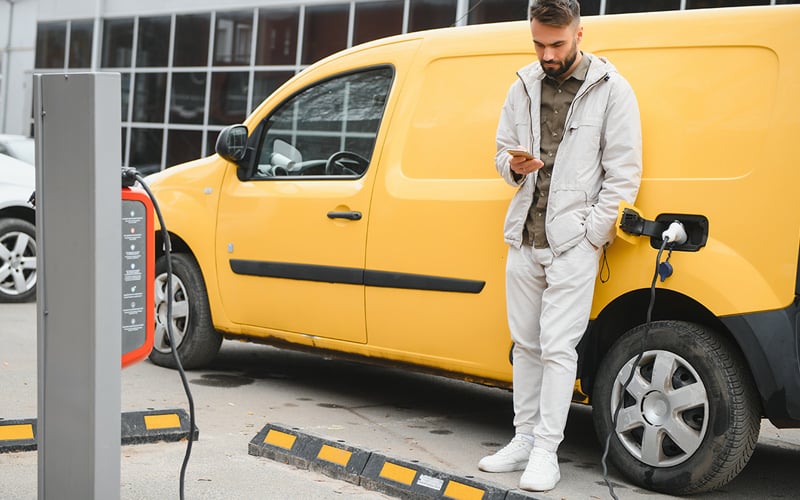The Complete Guide to Electric Van Charging

Find out everything you need to know about charging an electric van. From the different types of charge points to EV charging tips.
Table of Contents
2. How to find a charging point
3. How long does it take to charge an electric van?
4. How much does it cost to charge an electric van?
5. What connector types do electric vans have?
Have you recently made the switch to an electric van or are you about to pull the plug on fuel for good? Either way, you might be wondering about EV charging and how to charge an electric van.
We’ve put together an electric van charging guide to answer all your burning questions.
Types of electric van charging stations
Depending on how you like to charge your electric van, there’s a variety of options. From plugging in at home to public EV charging stations, you won’t be short on choice.
Standard home socket – 3kW
Most electric vans will come with a charging cable that can be plugged into a standard socket at home. However, using this method will increase charging time by a considerable amount. It’s best to only use this type of charger occasionally or if you have no other options to charge your van.
Home wall box – 7kW
If you have access to off-street parking, installing a home wall box is a convenient charging solution. While the costs can vary, they are very easy to install, taking only a few hours. With a home charger, you can also charge your electric van at night utilising cheaper electricity rates.
Own a flat or live in a rented property? You could be eligible for a £350 government grant towards the cost of installing a charger.
Fast public charging points – 22kW
A lot of car parks, supermarkets, and motorway services now offer fast EV charging stations. These are great if you need to power up in a rush and get back on the road.
Rapid public charging points – 50kW
One step ahead of fast charging points, rapid charging points are now becoming more common at public charging stations. They are especially handy if you are traveling a long distance and quickly need power. A rapid charger will power the battery to 80% and then slowly decrease the rate of charging for the final 20%. This helps to keep your battery in top condition.
Ultra-rapid public charging points – 350kW
Currently, a limited number of EVs can handle this speed of charging. But as electric van technology progresses, more ultra-rapid EV charging stations will crop up on our roads.
How to find an electric van charging point
Finding an electric van charging point doesn’t have to be a hassle. While you will spot them in local supermarkets, car parks, and motorway service stations, there’s also handy tools available.
Smartphone apps are available from Zap Map and Pod Point, which will easily locate your nearest charging point. They also allow you to plan your journey to the charging station and even pay to power up. You can also filter by type of charger depending on how quickly you need to get back on the road.
How long does it take to charge an electric van?
The time it takes to charge your electric van will vary on your method of charging and the size of the battery. If you are using a standard socket or home charge point, it could take anywhere up to 12 hours to reach 100% battery.
Ultra-fast and rapid charging points could give you 80% battery in as little as 30 minutes.
For more information, read our article on how long it takes to charge an electric van.
How much does it cost to charge an electric van?
Electric van charging costs depend on a few factors. This includes the type of charger used, the location, and the charging network.
Generally speaking, slower chargers are cheaper than fast or rapid chargers. If you have a home wall box installed, you can make use of cheaper electric rates at night.
Mercedes-Benz estimates that the cost of charging an eCitan Panel van is as little as £14.40 using an AC charger or 32p per kWh. Using a DC rapid charger would set you back £21.74 from 10-80% or 69p per kWh1.
1 https://www.mercedes-benz.co.uk/vans/technology/electric-vans/charging.html
What connector types do electric vans have?
Most electric vans are equipped with a type one or type two connector. A type one connector has five pins and is used for slow or fast charging. Whereas a type two connector has seven pins and can be used for rapid charging.
A type one connector generally has power ratings of 3.7kW to 7kW. While a type two connector typically has power ratings of 3.7kW to 22kW.
Electric van FAQs
What is the best charging routine for an electric van?
There are a few EV charging tips you can follow to prolong the lifespan of your battery and precious range.
- Pre-condition the battery before charging
- Avoid quick charging
- Charge at night if you have a home EV charging point
- Don’t charge your electric van to 100% battery
- Plan your route to include nearby charging points.
- Keep your van in the shade on hot days, or in a garage during the winter to conserve battery power.
Should I charge an electric van to 100% every night?
Charging performance drops when the battery of your electric van reaches 80%. That’s why it’s best not to charge the battery to 100%. Charging to 80% also improves the long-term health of the battery.
Is it best to run my electric van battery down before charging?
It’s recommended not to charge your electric van’s battery from empty as this can negatively affect battery life. We would recommend charging whenever the battery drops below 30%.
Electric vans at Vansdirect
At Vansdirect, we can help you electrify your business with our range of electric vans. Choose from trusted manufacturers including Citroen, Renault, Vauxhall, and Ford.
We can let you know about the government grants available for new electric vans and introduce you to our van finance options. From van leasing, to Contract Hire, Hire Purchase, and van fleet leasing, find an electric van suited to your budget.
Contact us today to start your new electric van journey with us.
Find this electric van article interesting?
Check out our Electric Van Hub where you'll find even more useful information such as the benefits of electric vans and electric van reviews.
















